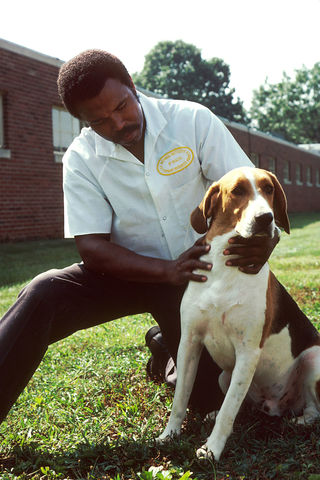In this article, we explore a fascinating and thought-provoking question: do dogs display racist behavior? As beloved companions and loyal friends, it’s easy to think of our canine pals as innocent beings devoid of prejudice. However, recent studies have sparked a lively debate, suggesting that dogs may indeed exhibit biased behavior towards individuals of different races. Join us as we delve into this intriguing topic, examining the evidence, the possible reasons behind such behavior, and what it means for our understanding of dogs’ cognitive abilities. Prepare to have your perspective challenged and your mind opened to a whole new world of canine behavior!
Can Dogs Be Racist?

This image is property of d.newsweek.com.
Understanding Racism in Dogs
Racism is a complex human social phenomenon, deeply rooted in historical, cultural, and societal factors. It involves prejudiced beliefs, discriminatory actions, and systemic oppression based on someone’s race or ethnicity. But can the same concept be applied to dogs? Many people wonder if dogs can exhibit racist behavior, and it’s an intriguing question that deserves exploration.
The role of social conditioning
As social animals, dogs learn from their environment, including the behaviors and attitudes exhibited by their human companions. Just like humans, dogs can be influenced by social conditioning. For example, if a dog grows up in an environment where they only come into contact with people of a particular race, they may develop a preference for or fear of individuals who look different. This preference or fear, however, is not innate but rather a learned response developed through their exposure and experiences.

This image is property of s28489.pcdn.co.
Innate behaviors and instincts
While dogs can be influenced by social conditioning, it’s essential to acknowledge their innate behaviors and instincts. Dogs have a natural tendency to form associations based on experiences and sensory information. They may react differently to individuals based on scent, body language, or past encounters. These responses stem from their survival instincts rather than any racial bias. It’s crucial not to mistake such responses for racism but rather as part of their evolutionary heritage.
The influence of human behavior on dogs
Humans play a significant role in shaping a dog’s behaviors and attitudes towards others, including the potential for racism. Dogs are sensitive to their owners’ emotions and reactions, and they can pick up on negative or discriminatory behavior. If someone harbors racist beliefs or engages in discriminatory actions towards certain races, their dog may mirror those attitudes due to the learned associations they make between specific races and the negative behavior they witness. It’s crucial for dog owners to model inclusive behavior and promote acceptance to prevent their pets from adopting any form of bias.
Case studies and anecdotal evidence
While scientific research on this topic is limited, there are anecdotal reports and case studies that suggest dogs can show varying reactions towards individuals of different races or ethnicities. However, it’s essential to approach these accounts with caution as they are not based on controlled or empirical studies. Anecdotes alone cannot provide a definitive answer and may be influenced by various factors, such as a dog’s previous experiences or health issues. Therefore, further research is needed to gain a more comprehensive understanding of dog behavior and racial bias.
The importance of proper socialization
To prevent the development of any discriminatory behavior, it is crucial to provide dogs with proper socialization from an early age. Exposing them to a diverse range of people, including different races and ethnicities, can help them form positive associations and reduce the likelihood of racial bias. Socialization should include positive interactions, treats, and rewards to promote a friendly and accepting attitude towards everyone they encounter.

This image is property of cdn.psychologytoday.com.
Training and counter-conditioning
If a dog does display signs of discriminatory behavior, it’s vital to address and correct it through training and counter-conditioning. Positive reinforcement techniques can help promote inclusion and discourage any biased tendencies. This may involve gradually exposing the dog to individuals of different races and rewarding them for calm and friendly behavior. With patience, consistency, and the assistance of a professional dog trainer, it is possible to modify such behavior and foster a more accepting stance.
Recognizing Signs of Racism
Recognizing signs of racism in dogs can be challenging, as their behavior may be influenced by various factors, including their innate tendencies, previous experiences, and human influences. However, if a dog consistently exhibits aggressive behavior towards individuals of a particular race or if they show heightened fear or anxiety in their presence, it may be worth considering the possibility of racial bias. Consulting with a professional dog behaviorist or trainer can help assess the situation and provide guidance on addressing and modifying such behavior.

This image is property of media.npr.org.
Addressing and correcting racist behavior
If a dog is displaying racist behavior, it is essential to address the issue promptly and effectively. This often involves a combination of behavioral modifications, consistent socialization, and positive reinforcement training. Seeking guidance from a professional dog trainer experienced in behavior modification will ensure that the training techniques used are appropriate and effective in dismantling any racist tendencies.
The impact of diversity and inclusivity in dog training
Promoting diversity and inclusivity in dog training is not only vital for addressing potential racist behavior but also for fostering a compassionate and accepting society as a whole. By encouraging exposure to different races and ethnicities and providing equal opportunities for all dogs, we can help prevent the development of discriminatory attitudes in our beloved companions. A diverse and inclusive training environment benefits both dogs and their human counterparts, allowing for enriching interactions, improved social skills, and a harmonious coexistence.
In conclusion, while dogs can be influenced by social conditioning and exhibit behaviors that may resemble racial bias, it’s important to differentiate these responses from true racism. Dogs are primarily driven by their instincts and experiences rather than holding prejudiced beliefs. Through proper socialization, training, and counter-conditioning, we can foster inclusive attitudes in our dogs, promoting acceptance and harmony among all individuals, regardless of their race or ethnicity.






